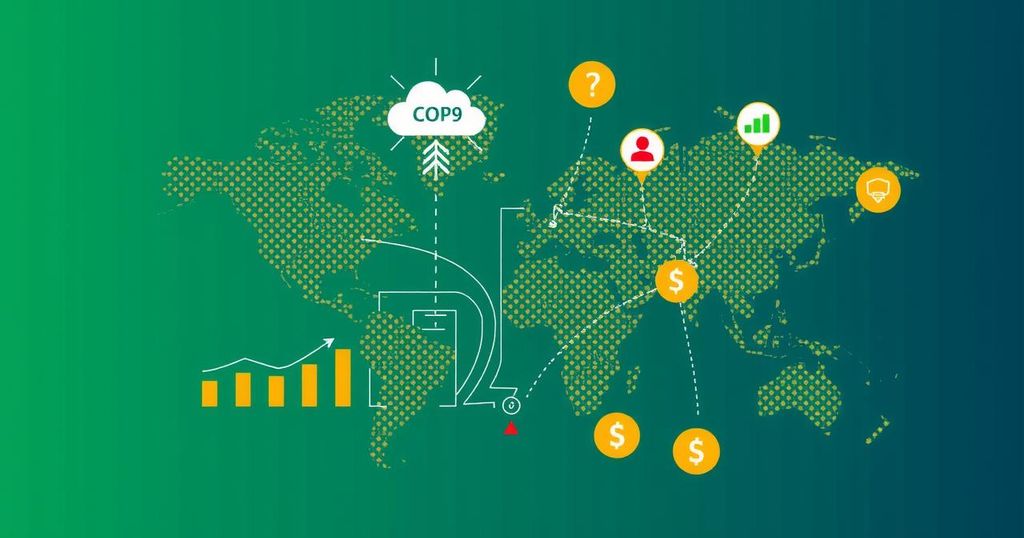COP29 concluded with a controversial climate finance goal that has drawn significant criticism for being grossly inadequate. With a new target of $300 billion by 2035, stakeholders have expressed dismay, highlighting that this figure falls drastically short of the $1.3 trillion deemed necessary. The agreement undermines trust in international climate efforts, particularly among developing countries reliant on support for climate resilience.
The climate negotiations at COP29, which culminated on November 23, have been met with widespread disappointment and criticism due to the inadequate new climate finance goal (NCQG) that was adopted without proper discussion. Critiques highlight that this decision not only undermines the credibility of the United Nations but also exacerbates mistrust among countries involved in addressing the pressing climate crisis. While a deal was reached to provide some financial support for developing nations, the amount agreed upon, $300 billion annually by 2035, falls drastically short of the $1.3 trillion deemed necessary for effective climate action. Such an outcome raises alarms about global commitment and effectiveness in combating climate change, particularly for vulnerable regions already facing severe environmental challenges.
The COP29 summit ended in unprecedented drama as negotiators described it as a culmination of failures to adequately address climate financing. Following last-minute negotiations in Baku, agreements were reached, but many felt the terms were unsatisfactory. Reports indicate that the figure for climate financing fell short of expectations set by vulnerable countries, particularly in the Global South. Activists and representatives from affected nations expressed their frustration over the lack of sufficient commitment from developed countries, particularly in light of their historical responsibilities.
Catherine Pettengell, Executive Director of Climate Action Network UK, lamented, “This is a bad deal for countries and communities on the frontline of the climate emergency.” She emphasized the necessity for equitable, transparent, and responsive climate action mechanisms. Pettengell noted that developing nations continuously face inadequate responses at each COP, shifting the burden onto the least responsible yet most affected populations.
Liz Cronin from CAFOD criticized COP29 for failing to meet the expectations set for this ‘Finance COP,’ alleging that entrenched patterns of negotiation left developed nations unaccountable. Echoing this perspective, Zahra Hdidou from ActionAid condemned the final agreement as a “complete catastrophe” and insisted that the proposed financing was nothing more than a pittance compared to what is needed.
The COP29 climate talks, a part of the ongoing negotiations under the United Nations Framework Convention on Climate Change (UNFCCC), were meant to reaffirm and enhance the commitment to climate finance, particularly for developing countries vulnerable to climate impacts. Climate finance is crucial for enabling these countries to build resilience against climate-induced disasters and to transition to sustainable practices. However, the outcomes of COP29 have sparked intense criticism from various stakeholders, raising questions about the efficacy of international climate agreements and the commitment of developed nations to their obligations toward the Global South. The negotiations at COP are particularly significant in the context of the Paris Agreement, which calls for financial assistance to developing nations that are bearing the brunt of climate impacts despite having contributed minimally to the crisis. The inadequacy of the agreed financing has been viewed not only as a failure in delivering support but as a betrayal of the trust that underpins global climate partnerships.
In summary, COP29 has emerged as a focal point of disappointment and criticism, particularly concerning the newly established climate finance goal that many deem insufficient to meet the urgent needs of developing nations affected by climate change. The adoption of a target of $300 billion by 2035 was met with indignation from various climate action organizations and activists, who called for significant reform in the approach taken by developed countries. The outcomes of this summit underscore a pressing need for renewed dedication to fulfilling historical financial commitments and ensuring that the voices of the most vulnerable nations are adequately represented in global climate negotiations moving forward.
Original Source: www.thecanary.co







